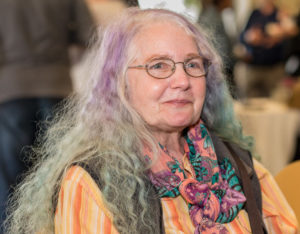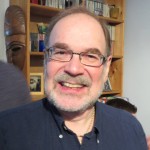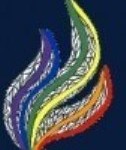When my mother died (May 29, 2014) I was present in the room, both in the hours before and the hour after. She was 89 and had lived a long life, but this death was the result of accident, not old age, not illness. My mom slipped and fell on the floor of the cafeteria in the nursing home where my father was living. At that time his Alzheimer’s was profound, and in combination with Parkinson’s had brought him to a place in life where my mother’s daily ministrations probably did not leave her feeling that she was able to help him much. My mother had sat with him day in and day out for hours at a time for several years. Reading, talking, communicating. On my twice yearly visits I sat with both of them too, but not as long.
I did not have an easy relationship with my mother ever. There were many moments in our life together that could best be described as “harsh passages.” I will explain that term shortly. In the last four years of her life it was especially difficult because she was mostly distraught. Not only was her husband slipping away, but we had lost son and brother in 2010 to a cancer which came on suddenly, although it gave us three months to accompany my brother as he prepared for death. Shortly before my brother’s illness, I had finally made up my mind to work very hard to communicate with my mom, to invite us both to share the pains and disappointments and blames and recriminations between us and, I hoped, to forge a sweeter relationship. But with the tragedy of my brother’s premature death and my father’s illness, the best I could do was to hold my mother’s hand for her last four years. I called her every week and listened.
When my mom fell in the nursing home, I was not there. It took them several days to contact me. By the time I heard from the hospital, they had already performed massive brain surgery, despite my mother’s strict wishes not to be resuscitated. I flew from Boston to California immediately. With the help of my parents’ extraordinary personal physician, we managed to convince the medical establishment that no, my mom would not like to wake up again in a vegetative or even bed-ridden state. The brain surgeon, I may say, was livid, but that’s another story. We moved her into palliative care, into a room with a beautiful view of an outside garden, and took no more extreme measures to keep her alive. My mom did not wake up again and I accompanied her as she took her last breath.
At that final moment, a profound peace came over me. I felt that my mother’s life had been very painful, particularly the last couple of years, and that she was now released. I felt that I would have no further experience of the “harsh passages.” Life, of course, is not so simple, but I am relating my feelings then. I stayed with my mom in that room for an hour or so after she died. As a Jew who came to Jewish practice late in life, I felt I should do something for my mom in that time. I picked up the hospital-supplied Gideon Bible and read the psalms in English. I knew that the traditional Jewish custom is to read Psalms in the interval between death and burial. This was my way of honoring that tradition. My mother was not Jewish, and probably would not have known the custom. She was in fact an atheist, but only mentioned that to me once. She had great respect for my dedication to Jewish learning.
In the years that intervened, of course many of my bitter feelings – of betrayal, misunderstanding, unhappiness etc – resurfaced, and warred with love and loss. In the commemoration of my mom’s yahrzeit (anniversary of death) this year (2019, five years following death), I prepared to read from the Torah. It was also my plan to speak about my mother on that Saturday morning. I did not have a planned speech, but I wanted to speak in such a way as to open myself up for healing – not to talk about how difficult it was for me to think about my mom. I made a particular point to go early enough for the recitation of psalms and prayers, because I understood them to be preparation for opening one’s heart to the Torah reading.
The Torah reading that morning was from Bechukotai (Leviticus 26:3 – 27:34). Although I was to recite only four verses, I studied the entire portion. There is a section where God lays out the harsh curses that will fall upon the Israelites if they do not follow God’s commandments. In short form, God says “… if you do not obey Me and do not observe all these commandments… I will wreak misery upon you” (Lev 26:14-16). These are harsh words. This is a “harsh passage.” Abraham Joshua Heschel devotes a section in God in Search of Man: A Philosophy of Judaism to “Harsh Passages.” He writes, “We encounter… a serious problem in a number of passages which seem to be incompatible with our certainty of the compassion of God… We must… realize that the harsh passages in the Bible are only contained in describing actions which were taken at particular moments and stand in sharp contrast with the compassion, justice and wisdom of the laws that were legislated for all times.” As we recited the Psalms that Shabbat morning, my thoughts went to the harsh passage. The curses of Bechukotai are indeed “incompatible” with the God we praise in the Psalms. Yet the recital of the Psalms prepares us to understand the harsh passages, the curses, as an action of “a particular moment,” not legislation “for all times.”
I was able to make the connection that morning in shul because I had learned of the teaching of Abraham Joshua Heschel from Rabbi Victor Reinstein, the rabbi of the synagogue where I was reading Torah. There is much more that can be said about harsh passages in the Bible. But what came to me as a new thought was that we have “harsh passages” also in life. As I wrote at the beginning, there were many moments in my life together with my mom which could aptly be called harsh passages. They were nowhere near the level of the curses in Bechukotai. Yet they function in a similar way. At the moment of my mom’s passing, as I read the Psalms, I felt the lifting of the harsh passages. But harsh passages don’t go away. Often in the past five years they have sat heavy upon me. It came to me in the reciting of the Psalms at shul that the difficult encounters in life need not be seen as legislation for all times. Rather, I could begin to understand that they were of a particular moment, and that I can dig deeper and uncover and cherish the underlying part of the relationship which is for all times. This will not chase the harsh passages away.
Rabbi Reinstein teaches, “On the surface of Torah there is often violence and strife, as in life. Sometimes on the surface itself, shimmering as a crystal fount, and sometimes beneath the surface, there is a river of peace that runs through Torah into whose flow we enter by engaging and wrestling with what Rabbi Abraham Joshua Heschel calls the ‘harsh passages.’” (http://ssdsbostonblog.com/dvar-torah-rabbireinstein-vayeshev/ retrieved 6/2/19). So too, I hope to find that river of peace with my mom, not by ignoring or hiding the harsh passages, but by engaging and wrestling with them in the secure knowledge that I can find again the peace that I knew in the moment of her passing when it seemed that all was resolved.



